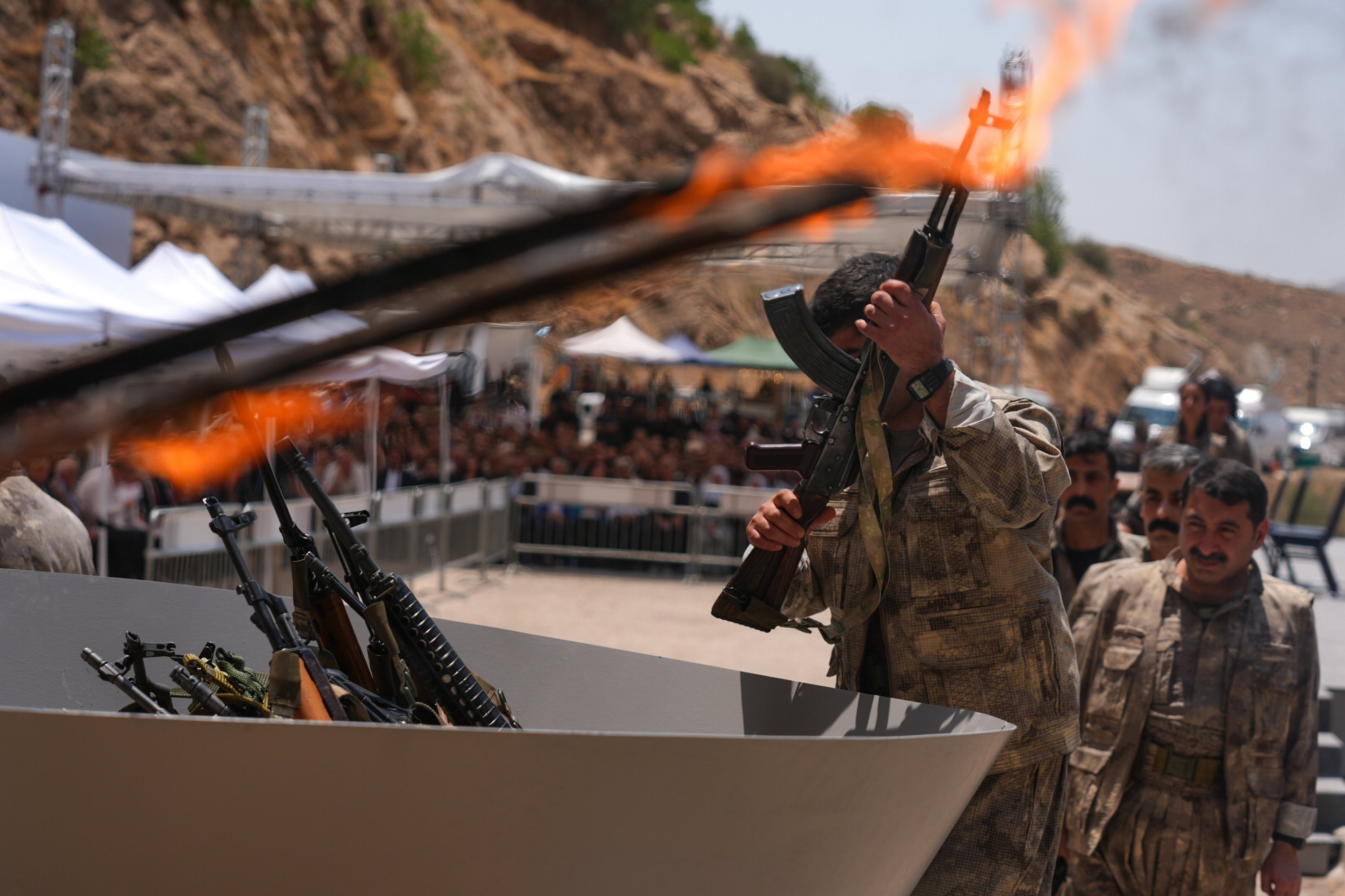Cautious Optimism, A Lot of Unknown Angles
Turkey awoke to uncharted political terrain on Saturday after the Kurdistan Workers’ Party (PKK) formally laid down its arms and President Recep Tayyip Erdoğan unveiled what he called a roadmap toward a “terror-free Türkiye.” Friday’s disarmament ceremony, staged inside northern Iraq’s rugged Casene Cave, closed a bloody four-decade chapter and immediately shifted the spotlight to Ankara, where the government, the opposition Democratic Equality and Freedom Party (DEM), and the ultranationalist Nationalist Movement Party (MHP) pledged to steer the transition in concert.
An hour after the symbolic ceremony in northern Iraq’s rugged Casene Cave, in a one-hour speech to ruling Justice and Development Party (JDP or AKP) cadres at the Kızılcahamam retreat, Turkish President Erdoğan devoted nearly all of his political remarks to the Kurdish file. He stressed that the new phase “is not the result of bargaining or give-and-take” but rather a historic opportunity to heal national wounds after “47 years of terror.” Parliament, he said, will establish a multiparty commission next week to draft legislation covering the return of rank-and-file militants, reintegration and vocational programs, and possible sentence reductions for fighters untainted by blood crimes. Each confidence-building measure, the president added, will pass through a “step-by-step staircase” tightly audited by security agencies vested with veto power.
Balancing Contrition and Sovereignty
Seeking to reassure Turks wary of partition while offering Kurds long-denied dignity, Erdoğan acknowledged past state abuses—“burned villages, mothers forbidden to speak Kurdish to their children in prison”—and conceded that heavy-handed tactics had prolonged the conflict. Yet he coupled contrition with a firm line on sovereignty: “We will never allow anyone to trample on the honor of the Republic of Türkiye,” he warned, adding that “water does not flow backward, but if it tries to, we know what to do.”
Next Steps: Monitoring Withdrawals, Drafting Reform
Behind the scenes, security and intelligence officials will supervise militant withdrawals while lawmakers shape the first reform package ahead of the October legislative term. Government insiders say a general amnesty will be considered only after the PKK’s dissolution is deemed irreversible by the National Intelligence Organization (MİT) and the Turkish Armed Forces (TSK). Until then, every move will be calibrated to field reports to ensure that “no step compromises the state’s fundamental characteristics.”
Rare Unity Across the Political Spectrum and Cautious Optimism
DEM leaders have hailed the framework as “the most concrete architecture for peace since 2015.” Even MHP chairman Devlet Bahçeli—long one of Ankara’s toughest Kurdish hawks—surprised observers by publicly urging imprisoned PKK founder Abdullah Öcalan to “end the bloodshed,” a call widely seen as helping to precipitate Friday’s ceremony.
Whether the fragile consensus can survive provocations on the ground, electoral jockeying, and regional spill-overs remains uncertain. Nonetheless, for the first time since the Oslo talks collapsed a decade ago, Turkey’s main political currents appear to be rowing in the same direction. “No one should be afraid,” Erdoğan told the nation. “Turks, Kurds, Arabs—86 million citizens—will build the Century of Türkiye shoulder to shoulder.”
Regional Uncertainty: Syrian Talks Collapse Cast Long Shadow
While Turkey discusses the next chapter of the Kurdish issue, critical negotiations between Syria’s transitional government and the Kurdish-led Syrian Democratic Forces (SDF) collapsed in Damascus on 9 July. The high-level meeting at Tishrin Palace—mediated by U.S. envoy Thomas Barrack and France’s Jean-Baptiste Faivre—broke down when Damascus rejected the SDF’s insistence on a federal arrangement for northeast Syria and the staged return of displaced civilians to Afrin, Ras al-Ayn, and Tel Abyad. Barrack’s declaration that “federalism doesn’t work in Syria” echoed Syrian Foreign Minister Asad Hassan Shaybani’s “one nation, one army” mantra and left the Kurds with little negotiating room.
Damascus has since placed units on high alert along every SDF contact line, while tribal militias in Deir ez-Zor have announced “general mobilization.” The risk of a fresh front directly affects Ankara’s calculus: Turkey’s domestic rapprochement with its Kurdish population is unfolding just as its southern neighbor reverts to maximalist policies that erase the SDF’s decade-old autonomy. Turkish officials worry that a violent spill-over could embolden hard-liners in Ankara and shatter the tenuous consensus painstakingly built at home.
Photo: Daily Sabah
